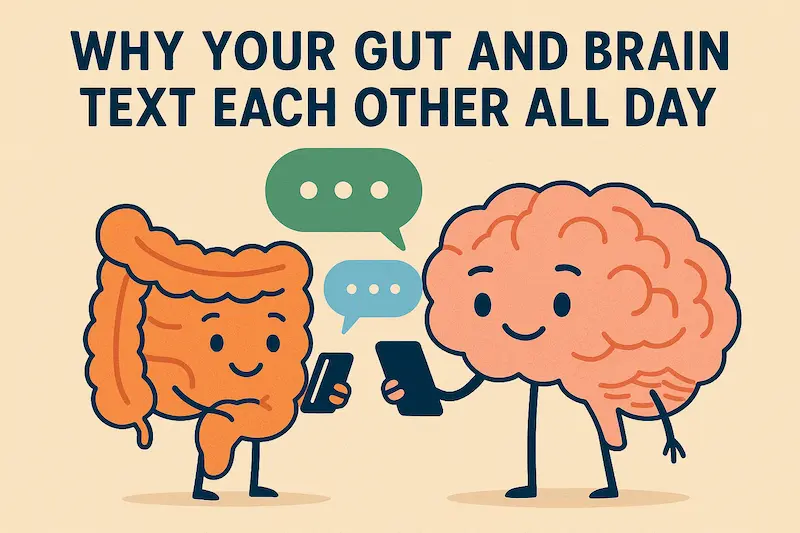Wait, My Stomach Can Text My Brain?
Not literally (no tiny iPhones in your intestines), but close. Your gut and your brain are in constant conversation through what scientists call the gut-brain axis. Think of it as a private WhatsApp chat where one side is obsessed with snacks, and the other is trying to run the rest of your life.
And unlike your group chat, this one really matters. The gut-brain axis is how your body links digestion, mood, stress, sleep, and even that foggy “why did I walk into this room?” feeling.
The Gut-Brain Axis: The Short Version
- Your gut has its own nervous system called the enteric nervous system (ENS). Nickname: “the second brain.”
- This ENS talks nonstop with your central nervous system (CNS) via the vagus nerve and other pathways.
- They swap info using neurotransmitters, hormones, and even gut microbes (yes, bacteria are in on the gossip).
Bottom line: if your gut’s unhappy, your brain’s likely to hear about it — and vice versa.
What Do They Talk About All Day?
1. Mood & Anxiety
Around 90% of your serotonin is made in your gut. So when your digestion is off, your mood can dip too.
2. Brain Fog & Focus
Ever notice you can’t think straight after a heavy meal? That’s the gut telling your brain, “Sorry, we’re busy down here with pasta duty.”
👉 Read more: Why Brain Fog Isn’t Just in Your Head
3. Stress
Stress can cause stomach knots, nausea, or sudden “uh-oh, where’s the bathroom?” moments. The brain shouts, the gut panics. Classic.
👉 Related: Stress and Digestion: Why Your Stomach Freaks Out
4. Sleep
Gut microbes help regulate melatonin, the sleep hormone. If your gut ecosystem is off-balance, your brain’s sleep schedule might suffer.
👉 Read more: Gut Health and Better Sleep: The Surprising Link
Microbes: The Group Chat Moderators
Inside your intestines lives a wild ecosystem of trillions of bacteria, fungi, and other tiny roommates. Collectively, they’re called the gut microbiome.
They:
- Help digest food
- Produce vitamins
- Influence inflammation
- Signal directly to your brain
When the microbiome is balanced, your gut-brain conversation stays civil. When it’s disrupted? Expect arguments, mood swings, and maybe some late-night junk food cravings.
How to Keep the Chat Healthy
Here’s the good news: you don’t need a PhD to support your gut-brain axis. Small, daily habits help:
- Eat fiber-rich foods (whole grains, beans, veggies).
- Get enough sleep (your microbes need rest too).
- Manage stress (breathing, walks, or just screaming into a pillow — hey, no judgment).
- Move your body (exercise helps both gut flow and brain clarity).
The Takeaway
Your gut and brain are basically besties who never stop texting. If you treat your gut well, the conversation stays calm, supportive, and helpful. Ignore it, and your brain might just get spammed with complaints.
⚠️ Disclaimer: This post is for informational purposes only and not medical advice. If you’re struggling with gut or mental health issues, please talk to a qualified healthcare professional.

Alex Keane is a health writer and gut health researcher with a personal mission: help people stop feeling like garbage for no clear reason. After years of dealing with brain fog, digestive issues, and 3am anxiety spirals, Alex started digging into the connection between the gut and the mind — and never looked back.
When not writing about microbiomes, Alex is usually found experimenting with fermented foods, walking obsessively, or trying not to buy more supplements off Instagram.
Alex is not a doctor, and that’s probably for the best.

